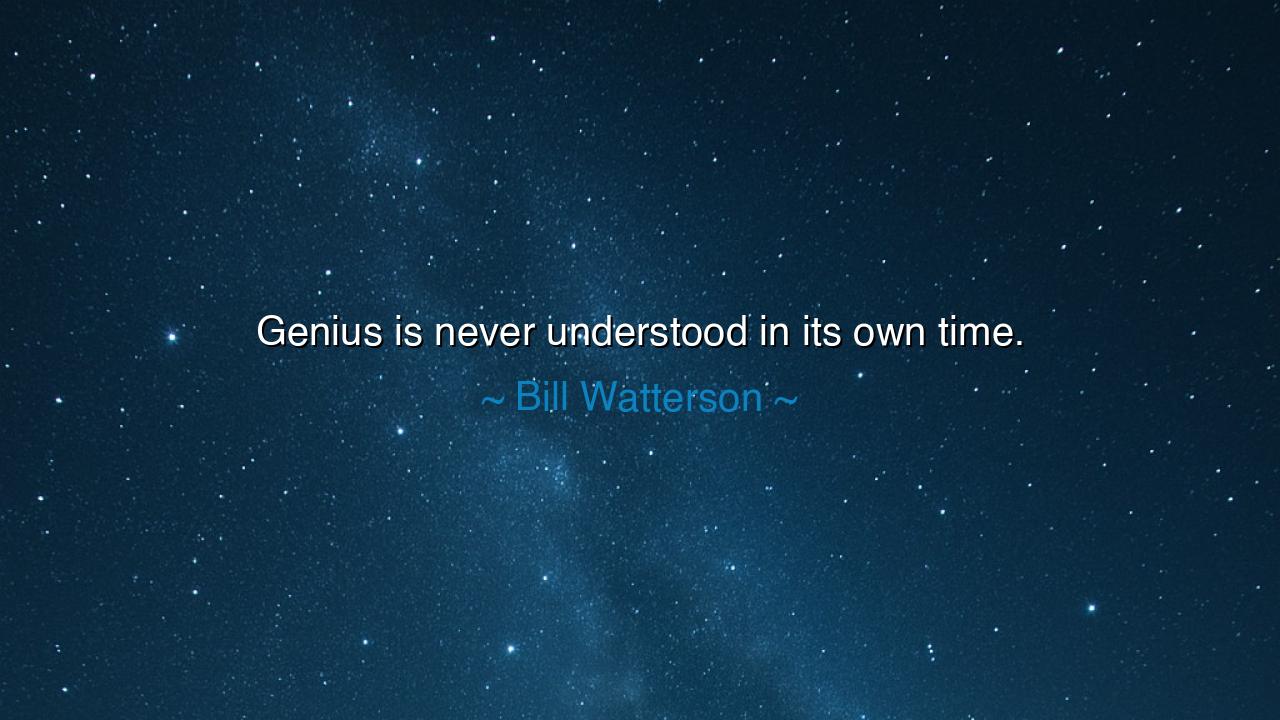
Genius is never understood in its own time.






Hear the words of Bill Watterson, the quiet sage who gave the world Calvin and Hobbes, yet turned away from fame’s glitter: “Genius is never understood in its own time.” These words carry the weight of centuries, for they reveal the sorrow and the glory of visionaries who walk ahead of their age. To see differently, to think beyond the boundaries of the present, is to be misjudged, ridiculed, or dismissed by those who cannot yet see the truth. And so, the genius bears the loneliness of their gift, honored only by future generations who reap the harvest of what once seemed folly.
The ancients knew this truth well. Was not Socrates condemned to drink poison, accused of corrupting the youth with his questions, when in truth he was awakening them to wisdom? In his time, his city saw only a nuisance, not a teacher of eternal truth. Yet centuries later, his name is honored as one of the founders of philosophy. Thus Watterson’s words echo across the ages: the genius is rarely celebrated by contemporaries, for the light they carry blinds as much as it illuminates.
Consider the tale of Vincent van Gogh. In his lifetime, he sold almost no paintings, dismissed as mad, his art too strange, too raw for the eyes of his era. He lived in poverty, misunderstood, often shunned. Yet today, his works hang in galleries across the world, treasured as masterpieces, his colors and strokes recognized as a window into the soul of humanity. His time rejected him, but posterity crowned him. This is the burden of genius: to labor in obscurity, planting seeds whose fruit one may never live to taste.
Even in science, the same pattern unfolds. Galileo looked through his telescope and declared that the Earth was not the center of the universe, but instead a wandering planet among stars. For this truth he was tried, condemned, and silenced. His genius was feared, his discoveries despised. Yet in the centuries that followed, his name became immortal, the father of modern astronomy. Again the truth of Watterson’s words resounds: the time of genius is often not the present, but the future.
But hear this warning, O seekers of wisdom: if you carry a vision, do not expect it to be welcomed. The genius must be prepared to walk alone, to face mockery, to endure rejection. The path of originality is strewn with misunderstanding. Yet take courage, for history shows that while the present may scorn, the future remembers. The light you carry may not shine for you, but it will blaze for others.
The lesson is clear: do not measure the worth of your work by immediate applause. Applause is fleeting, but truth endures. If your vision is genuine, if your creation carries the weight of honesty and courage, then time itself will vindicate you. The genius does not serve the present moment; they serve the eternal.
Practical wisdom lies before you: labor not for praise, but for purpose. Create, build, think, and dream, even when others dismiss you. Take comfort in knowing that every great soul—artist, thinker, leader—was once misunderstood. Keep your gaze fixed not on the approval of your peers, but on the enduring value of your work. For if it is true, it will outlive rejection.
Therefore, let Watterson’s words be your armor: “Genius is never understood in its own time.” Carry them with patience. Accept misunderstanding not as failure, but as the mark of originality. Endure, persist, and trust that the future will speak the truth of your labors. For though genius walks alone in its day, it walks crowned in the days to come.






AAdministratorAdministrator
Welcome, honored guests. Please leave a comment, we will respond soon